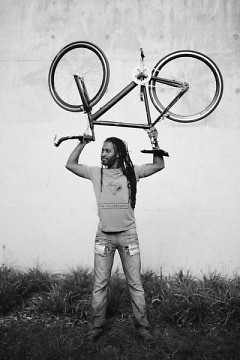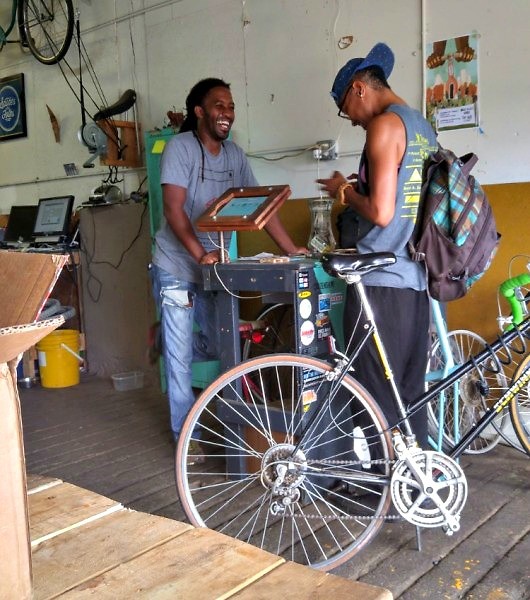
The author of this article, Martel Posey, having fun with his bike /Leigh Ann Cobb Photography
This dispatch was added by one of our Nonprofit Neighbors. It does not represent the editorial voice of The Rapidian or Community Media Center.

Martel Posey helping a patron after servicing their bike /Jay Niewiek

The author of this article, Martel Posey, having fun with his bike /Leigh Ann Cobb Photography
At The Spoke Folks, our goal is to ensure everyone has access to a safe and reliable bike. As a part of this, we have known disenfranchised communities, especially communities of color, need our services the most.
This summer the mobile repair shop was set up at Duthler's Family Foods near the neighborhood I spent most of my childhood in. I knew it would be great opportunity to engage with the community. Our main focus was to do basic tuneups, build trust, and start the framework for a relationship that will last for generations. We quickly realized the problem to be far worse than we could have ever imagined when we started taking the mobile repair truck out to events.
The historical context in our city for communities living in poverty is very polarizing. As a black male who was raised on the south side of Grand Rapids, bicycles were an important part of growing up. It was your vehicle to get off of the city block you grew up on and see different parts of the city. So if your bike needed repair and you didn't have money, you road around on a bike that wasn't safe. When you had a problem with your bike, you fixed it on your own, by any means necessary. We improvised, we took parts from other bikes but most of all we rode and we had fun.
Growing up seeing your community take so much pride in the ownership of a vehicle, I eventually ditched my bike and got a car. Naturally, that seemed like the next step as I grew up and started to use a different means of transportation. Until four years ago, when I decided to get back into using my bicycle for transportation. Although I was lucky to only have one flat tire over the span of a few years, I still knew I couldn't take my bicycle to a normal bike shop. Generational knowledge told me that it was no place for me and it would cost me too much money, money most folks don't have.
Let's deal with what we at The Spoke Folks have seen in the community for a vast majority of our interactions. If you currently live in poverty I'm willing to go out on a limb that you probably won't go out and spend six hundred dollars on a decent entry level bike. It's more reasonable that a person would purchase a department store bike (that was designed with no integrity and intention to function properly over time for the rider). When mechanical issues arise people may not find the bike valuable enough to spend more money than it cost them to purchase to fix it.
For-profit shops definitely have their place for their target demographic but the disenfranchised communities that have less access to resources get pushed away. Over the course of several generations people just stop going to for-profit bicycle shops.
The long term relationship within our city is one that's very black and white. Communities living in poverty know that there are barriers when it comes to getting what they truly need.
The cause of the disconnect comes from the charitable-industrial complex and the organizations who think that they are helping. Locally several organizations give away bicycles of the worst quality to poor communities who need them. These bicycles look nice and shiny but under the surface they are nothing more than a shiny poor example of transportation. You know the saying "Give a man a fish and he'll eat for a day," well, these bikes are more like giving them a fish that's been rotting in the cooler for a couple of weeks. Now those same people in the community that the charities meant to help have a bike that doesn't work six months down the road, without the money to repair it.
This is where our mobile repair has helped us address some of these issues that have plagued the community for so long. Our work is by no means the sole solution, but it's a step in the right direction.
The need for this type of impact is larger than just the neighborhoods that we can currently provide service to, but a problem that extends through most of the metro Grand Rapids area. This is why we need help and support so we can continue our mission to get as many butts on bikes as possible.
Collectively, it is our responsibility to do charitable work with integrity so that the whole system has meaningful impact on the future of the people. We bring what The Spoke Folks embodies right to the heart of the issue. The thing that people need the most is for their bikes to function properly.
It's so amazing when we have community partners and organizations who support what we do. This coming Thursday, September 29, 2016, we invite you to the YogABeats 88: Rooftop Party where proceeds will help fund the work The Spoke Folks do.
The Rapidian, a program of the 501(c)3 nonprofit Community Media Center, relies on the community’s support to help cover the cost of training reporters and publishing content.
We need your help.
If each of our readers and content creators who values this community platform help support its creation and maintenance, The Rapidian can continue to educate and facilitate a conversation around issues for years to come.
Please support The Rapidian and make a contribution today.